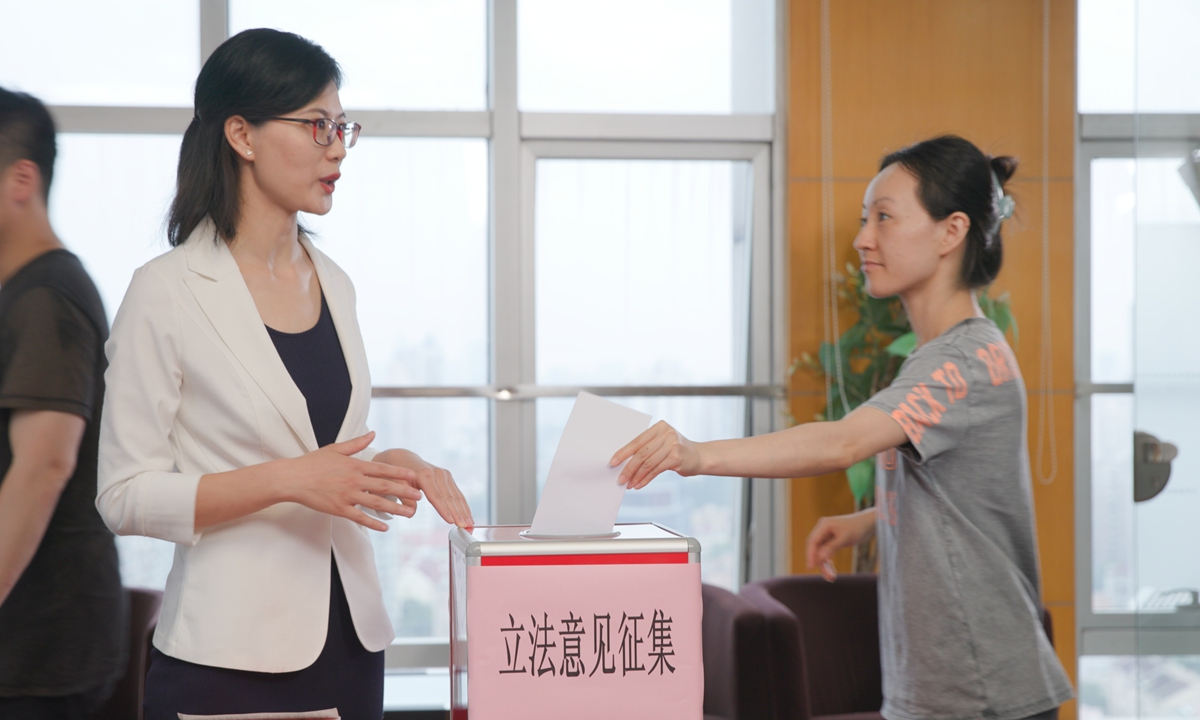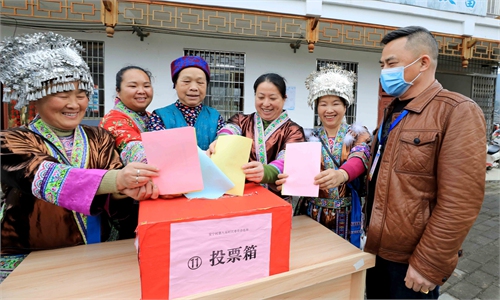IN-DEPTH / IN-DEPTH
China’s whole-process people’s democracy presents a new perspective on democracy in the world: expert

Wu Xinhui (left) works at the civic center in Shanghai's downtown Hongqiao. Photo: Courtesy of Wu
At present, democracy, freedom, and human rights have become the focus of international ideological confrontation. The discourse and political narratives around democracy are not mere conceptual and academic discussions anymore, but have become politic disputes deliberately provoked by US-led Western countries.
Democracy is not an ornament to be used for decoration; it is to be used to solve the problems that the people want to solve, Chinese President Xi Jinping, also general secretary of the CPC Central Committee and chairman of the Central Military Commission, said at a central conference on work related to the people's congresses, in October 2021 in Beijing, the Xinhua News Agency reported.
"Chinese democracy is comprehensive in content, fluid in process, and rich in its variety of form," Zhang Shuhua, director of the institute of political sciences at the Chinese Academy of Social Sciences, told the Global Times.
The grassroots-level legislation contact points have emerged and flourished along with the development of China's whole-process people's democracy, demonstrating that China's democratic idea is rooted in the hearts of the people and the democratic practices are full of vitality, Zhang said.
Zhang noted that the mechanism of grassroots-level legislative contact points provide an authentic and effective way for the people to participate in national legislation which includes the complete legislative process including the drafting, deliberation, and implementation of the law. "The legislative coordinators in grassroots-level legislative contact points listen to people's advice and then deliver people's opinions faithfully to the national legislative institutions, ensuring that useful suggestions from people are reflected in the law," he said.
The whole-process people's democracy in China not only has a complete set of institutions and procedures, but also full participation and practices, Xi said, noting that it is the broadest, most genuine, and most effective socialist democracy.
"China's democracy is not about periodical and intermittent voting, but a people-centered whole-process democracy that includes elections, consultations, supervision, and deliberation. It is a form of high-quality democracy which integrates democratic form and democratic efficacy," Zhang illustrated.
Meanwhile, the livestream feed from Lujiacun village in East China's Zhejiang Province showed how it decides affairs through holding villager congresses, reflecting the fact that China has a socialist, consultative democracy system with diverse forms, reasonable procedures, and complete links, and that institutions at all levels under the leadership of the CPC have an active sense of institutional innovation, constantly promoting the broad, multi-layered, and institutionalized development of democracy in China, Zhang said.
Zhang noted that different from the baseless slander occasioned by the West, the whole process of Chinese democracy is visible and tangible to the people, providing them with a regular channel to express their authentic interests and demands. In contrast, scenarios in Western elections in which politicians make unreachable promises but forget them the minute they are elected will not happen here.
"Democracy must be adapted to the fundamental realities of the country, and practiced and examined by the people," Zhang said, noting that China's democracy, mainly characterized by China's whole-process people's democracy, embodies the outstanding governance capability of the CPC, breaking through the previous framework of Western democracy and presents a brand-new perspective on democracy, leading China to a new path of political development.

